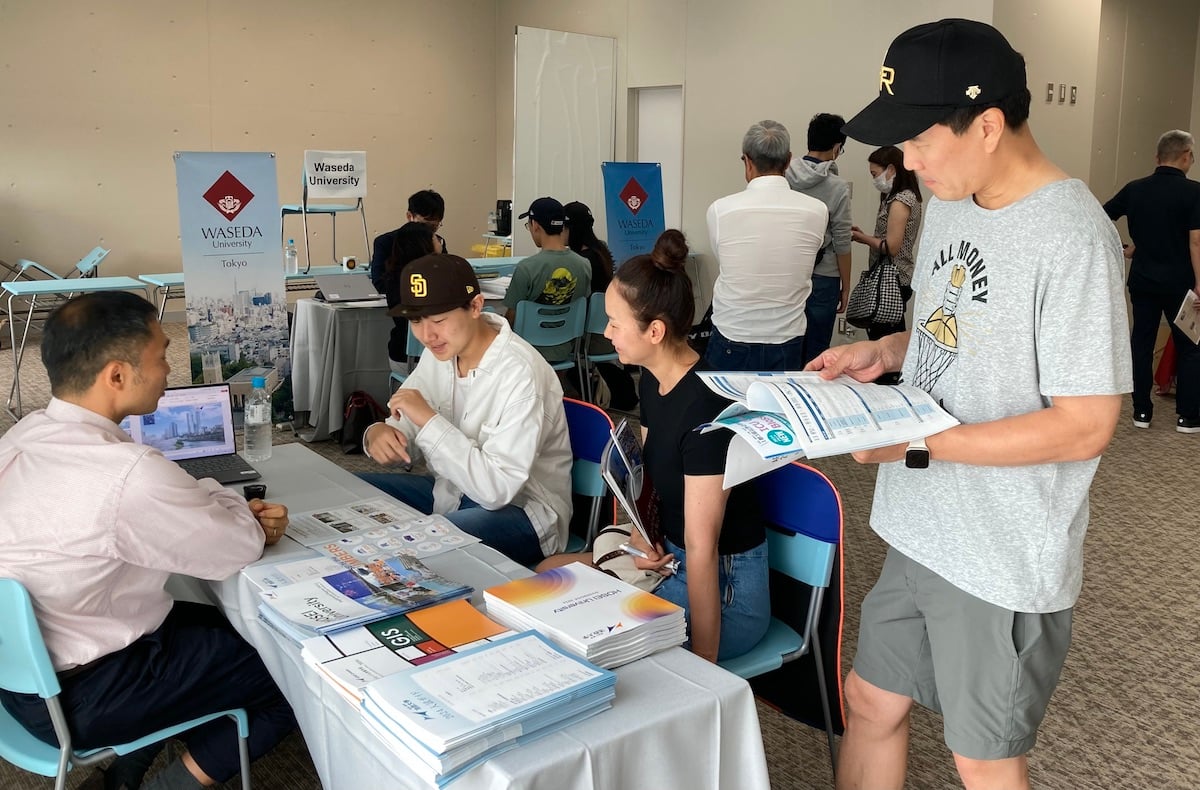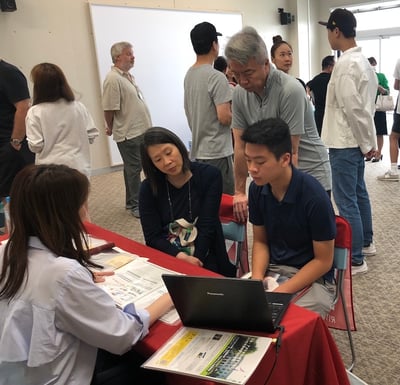Why Students and Parents Should Consider Japan as a Destination for University

So, you taught them how to walk, ride a bike, and a million other little milestones that parents help children navigate. Now it is time to help them plan where to go after graduating high school, and you are in the home stretch of helping them negotiate some big decisions that will affect their futures.* What is a parent to do?
Don’t worry, you are not alone, and neither is your student! NIS counselors, Ms. Hayashida and Mr. Moody are here to help students and parents trudge through the myriad of questions on the seemingly long path of college applications that await to come through on the other side, informed and ready to make some real decisions.
However, the physical path in front of students at NIS may not actually be so distant if your student decides on a Japanese university. This post discusses the advantages and disadvantages of studying in Japan and how parents and their students can learn more to make a decision that best supports their bright futures!
At the end of the 2022-23 academic year, NIS hosted a college fair and invited 10 Japanese universities to talk with NIS students and parents about what programs they have to offer. The college fair gained momentum compared to the small post-COVID event held last year. It was open to all secondary students and their parents and was well-attended. These are some of the takeaways from the fair, offering information you might want to consider when helping your student think about post-NIS study.
Japanese Universities Have Come a Long Way
Of course, Japanese Universities have garnered a high level of prestige globally, many with Nobel Laureates to hang their credentials on. But until recently, these institutions didn’t offer pathways for NIS students who weren’t fluent in Japanese. Coupled with rigorous and obstructive entrance hurdles, it has been difficult for NIS graduates to navigate the process.
However, in the past decade, the Japanese government has actively promoted the internationalization of higher institutions through programs such as the Global 30 Program, which aimed to “promote internationalization of [the] academic environment of Japanese universities and acceptance of excellent international students studying in Japan.” In the nearly 15 years since its inception, Global 30-funded universities (and others outside the program) have been steadily increasing their English language programs, warranting a serious look into what these institutions have to offer NIS students.
The IBDP Gives Students an Advantage
The choice to offer the International Baccalaureate Diploma Program (IBDP) at NIS has opened more doors for students. According to Moody, before NIS offered the IBDP, most students headed overseas for university. Now, he says the applications are about 50/50 between Japanese and overseas universities, with destinations of Japanese universities sometimes outweighing those of overseas. He commented that other factors like economic and political factors overseas, combined with the COVID pandemic might be in play in recent years. Still, he sees a trend that is continuing.
In addition, both Moody and Hayashida agreed that they are seeing universities actively courting IBDP students. Comments from the university representatives indicated that they like IB students because they are collaborative and creative. They recognize that IB students can brainstorm and think outside the box more easily than other students, especially those from Japanese schools. Of course, this is not to say that the students graduating from Japanese schools aren’t imaginative, but the learning environments that they come from tend to stifle creativity. In particular, a representative from Tsukuba University mentioned that, especially in science and engineering, they are looking for students who can think critically and creatively, and IBDP students are often the fit they are looking for.
The Advantages and Disadvantages
When deciding whether to study overseas or within Japan, regardless of your nationality, there are certain advantages and some possible hindrances to keep in mind when looking at these degree programs in Japanese universities based in English.
Understandably, one of the most significant considerations is financial. With the weak yen and escalating tuition rates in certain parts of the world, particularly the U.S., tuition costs for even some of Japan’s most respected private universities look like a bargain. Together with issues like safety, and proximity to home for those with parents in Japan, some students (and parents!) might want to think about these significant factors in addition to financial ones when contemplating whether to study in Japan or head overseas.
Class sizes also matter. University class sizes in Japan tend to be smaller than many larger overseas schools. Add in the fact that some of the international programs are even more compact, offering intimate learning environments, and it makes it even more important to consider which atmosphere will provide the best possibilities for students to thrive. Things to think over…smaller programs can enable undergrad students to have meaningful interactions with their professors and experiences that sometimes only graduate students in larger universities might be able to experience. Many of these experiences can bulk up a portfolio, creating a beneficial advantage for a new college graduate seeking first-time employment.
On the other hand, larger universities will provide a wider choice of opportunities. What you might give up with small and familiar becomes expansive and endless possibilities to find your spark. Some students find that the edge of anonymity motivates them to find their niche and create their own, rich experiences. It is important to consider what kind of experience your child is seeking.
Finally, the breadth of coursework offered at international programs in Japanese universities is still quite limited. However, according to Moody and Hayashida, they are expanding every year and have come a long way since even a decade ago. Where Liberal Arts curricula in mostly the world of Humanities were the norm of offerings, more diverse options of coursework are starting to show up in the brochures. Again, Tsukuba University is a good example. It was the first time for a representative from Tsukuba University to come to NIS, and out of the seven courses offered, five are science or engineering-based. Nagoya University has also offered mostly science-based majors from the inception of its Global 30 program.
Moody mentioned that there are still areas of study missing that NIS students sometimes find frustrating. For example, courses in Psychology, Fine Arts, and programs in Medicine are still challenging to find. And with Medicine, though not impossible,** some students have found the traditional entrance route in Japan to be rather prohibitive. Indeed, these are all things to ponder when looking at possible school options in Japan.
The Importance of College Fairs and the Counseling Team
As a team, Moody and Hayashida are continuously striving to uncover opportunities for students and parents to think about when it comes time to seriously consider post-NIS futures. The college fair held in June provided invaluable chances for students to take a good look, ask questions of representatives, and contemplate what it would be like to study in Japan.

Mone, a Gr. 10 student at the time, commented, “Each of the booths was outstanding, and they helped me to consider the various course options. Realizing that there were multiple universities with choices really opened my eyes.”
Mone’s mother also appreciated the opportunity to attend such an event, commenting that “she [Mone] had planned to apply and study at universities overseas, but after this fair, she really wants to study at a Japanese university.” She also mentioned that a consultation with Hayashida after the fair helped answer additional questions.
Masaki, who was finishing Gr. 11, had a great experience, noting the timing was perfect for her to ponder over the summer some of her previously held notions of what she wanted to study in university.
“Without this college fair, I really wouldn't have considered pathways other than medicine. However, now I am in a dilemma, not knowing whether to major in economics or medicine [in the UK]. I think the timing of this event was great!”
She also mentioned some of the factors that are influencing her: “The biggest difference I believe between the UK and Japan is the tuition and the level of difficulty. In the UK, the tuition fees for international students are far more expensive. Yet, although Japan is cheaper, it is far more competitive. With a limited number of universities accepting the IB as of 2023, their academic standards are very high.”
Final Words for Thought
Though each student must forge their own path, do their research, and complete their applications, as parents it is helpful to support them by knowing the landscape and asking critical questions to help them ponder the possibilities. Taking full advantage of visiting college fairs like this, as well as seeking guidance from our college counseling team, should help make the path a little less daunting for both students and parents.
Having more options for studying in Japan has changed the landscape in the past decade, and with the various institutions offering more of a selection, students will certainly find their own “best” path if they consider the pros and cons and weigh them against what kind of environment they are seeking.
The path may seem a little rocky at the outset, but rest assured that as a parent, you’ll make it through, and so will your student. Knowledge is key, and NIS is here to help!

*Spoiler alert - children will still (always?!) need their parents, even after they have flown from the nest! You won’t be off the hook yet!
**NIS grads have enrolled in Aichi Medical University, Okayama University Medical School, as well as Aichi Gakuin School of Dentistry.



